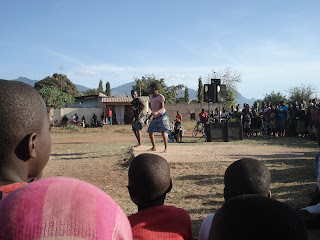Written: October 3rd, 2009Before I begin, I should note that free time is at a premium here, and often I have other things I need to do to stay sane, so I am sorry in advance if I miss some time. I will do my best to keep people up to date, but if my schedule this first week is indicative of my future schedule, the entries may be less than stellar. I will try my best though.
I guess it has been a while since I last wrote (not including the previous entry which I probably posted at the same time as this one. A lot has happened since then. To keep things interesting, I will use this post as an overview and then go through one by one the major things about my life here.
We (assume I mean Nicole, Melissa and I, the three YCI volunteers here) arrived in Morogoro on Wednesday night and were brought to our homestays. I will be as honest as I can. My first impression was not one of being happy about my situation. I'd be lying if I said this was the worst place I've stayed, but it is definitely the worst place I've stayed more than a few days. The house is basic, though we do have electricity (when there is not an outage), running water (sometimes, I think only in the mornings, but I have not asked). I have a bed and a lock on my door. I also have a fan (not the first night) to keep me cool while I sleep. The Hilton it is not, but I should be able to survive here for the next 7 weeks (me having already completed my first week... well almost). The facilities (i.e. the washroom) are not what one would hope for, but I will say that it's suprising what can seem normal when you don't really have a choice.
The family I am staying with is very nice, though basic English is a bit of stretch. Still, I am learning a bit of Swahili and we understand each other mostly (my Swahili-English dictionary comes in handy often). The food they make me is edible and tastes good. I probably won't be seeking it out often when I return, but I am pleased. There is a strong emphasis on white bread and white rice, but surprisingly I am feeling mostly healthy and energetic (this might be the multivitamins at work).
Mosquitoes are numerous (I've killed 7 today... I really should have started with a tally), but they don't seem to bite me. One of the other volunteers (not sure who) has a theory that the malaria pills make me less enticing. Any medical professionals (or soon to be medical professionals – I know I should have both reading this) want to comment? I've been bitten a few times, but so far I have had no signs of malaria, yellow fever or Japanese encephalitis (or any other mosquite-borne bugs).
Morogoro is definitely very different from any other city I've lived in (since I get this question a lot, you'd think I'd have an easy time explaining things, but I don't, so specifics will have to come in bits and pieces over time). Some big things that are noticeable: 1) No traffic signs (rules?): for those of you who live(d) in Korea, this place makes Seoul look like a well ordered city when it comes to traffic. And they drive on the left, so I'm always forgetting which way to look for traffic. Hahaha. It's all ok though. 2) Buildings are very basic. This is hard to elaborate, but as I post pictures, you will see over time. 3) There is sand/dust everywhere. I have to clean my feet when I come home. 4) People talk to/greet each other much more often than those in any city I've lived in. Honestly, there are more differences to list and I could probably write a blog post on all of them (maybe I will if I have time, tough I think that is unlikely.
As for what I did the first few days in Morogoro. Orientation and tours of where we will do our projects was the first order of business. Things are coming into focus and I've actually been assigned some of the projects. The only ones I'm not doing (see the post about the
projects) are the Secondary School HIV/AIDS club and working with the older PLHIV kids (though I probably will help with them). I will be busy planning I think, but it does look like I will have a good time and be able to use my skills to help people. There will likely be much more (perhaps I'll do a very in-depth post on each project I am working on) at a later date here.
We have met many people here (I have forgotten most of their names) but as time goes by, I'll probabl do formal introductions of all the important people in my life here.
As for now though, this post is getting way too long (congratulations if you managed to get this far). Sorry, but I don't have many pictures of Morogoro now (you'd understand why if you were here – more on that later), but I will try to get some shortly (the post after this will have some). Thanks for reading and keep on keeping on!
Tutaonana! (See you later – yes, I am a language snob, get used to it).






























